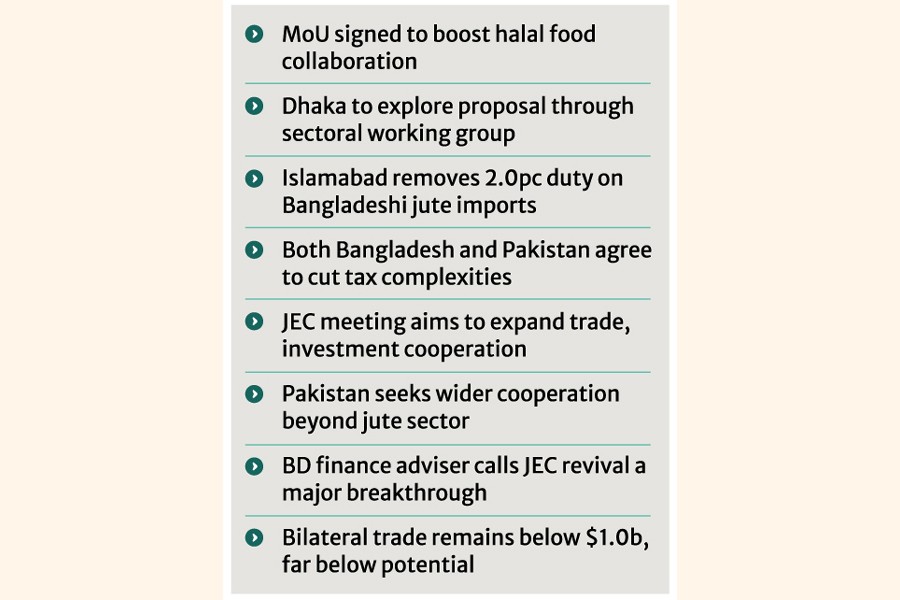
Published :
Updated :

Pakistan has offered Bangladesh the use of its Karachi port for conducting foreign trade with countries such as China, Gulf, and Central Asian nations, officials said on Monday.
In response, Dhaka expressed interest in exploring the proposal by forming a sectoral working group, officials attending the Joint Economic Cooperation (JEC) meeting in Dhaka said.
Both nations also agreed to eliminate tax-related complexities, with Islamabad pledging to reduce taxes on jute and certain other products to help Dhaka enhance exports and narrow the trade gap. Pakistan has already removed the 2.0 per cent customs duty on jute imports from Bangladesh as a gesture to improve trade and economic cooperation.
After 20 years, Bangladesh and Pakistan convened the 9th JEC meeting in Dhaka to strengthen bilateral cooperation.
The delegations were led by Bangladesh Finance Adviser Dr Salehuddin Ahmed and Pakistan Federal Minister for Petroleum Ali Parvez Malik, who agreed to form a working group to explore further trade and investment opportunities.
The Economic Relations Division (ERD) organised the meeting, marking the first JEC session since 2005.
"Pakistan is interested in importing jute and jute goods from Bangladesh, as the South Asian nation is strong in jute and textiles. Bangladesh wants to export products like jute and others," said an additional secretary at the ERD.
Officials said both sides expressed interest in wider economic cooperation, including people-to-people and business-to-business relations.
The two countries also aim to strengthen cooperation in halal food production and export, as the Bangladesh Standards and Testing Institution (BSTI) and Pakistan Halal Authority (PHA) signed a Memorandum of Understanding (MoU) in Dhaka on the sidelines of the JEC.
After the meeting, Pakistan's Federal Minister Ali Parvez Malik said Islamabad is eager to expand trade and economic cooperation with Bangladesh across multiple sectors, moving beyond traditional areas such as jute.
"A lot of convergence has been achieved under the chairmanship of Dr Salehuddin, and we now plan to make tangible progress for the betterment of our people," he said.
Mr Malik noted that the current trade volume between Bangladesh and Pakistan remains below $1.0 billion, which he described as "far below potential," given the size and complementarities of the two economies.
He reaffirmed Pakistan's interest in importing jute - a long-standing trade item - but said cooperation should now also cover agriculture, pharmaceuticals, power, and energy.
"We will, In Shaa Allah, try to expand beyond jute while keeping it a mainstay of our cooperation," he said, expressing gratitude to the Bangladeshi delegation for their hospitality and congratulating them on the "successful conclusion of this long-awaited dialogue."
Finance Adviser Dr Salehuddin Ahmed called the revival of the JEC a "remarkable breakthrough", describing the meeting as the start of a pragmatic partnership built on shared economic interests rather than political sentiment.
"It's not just about two countries; it's about regional cooperation," Dr Salehuddin told reporters. "If South Asian nations engage in practical economic collaboration, everyone benefits."
The 9th JEC, held at the NEC Conference Room in Dhaka on October 27, brought together a 15-member Bangladeshi delegation led by Dr Ahmed and a 14-member Pakistani team led by Mr Malik. Discussions covered key sectors including agriculture, education, food security, trade, energy, and IT.
The last (8th) JEC between the two countries was held in September 2005. Relations cooled after the Awami League assumed power in 2009, but diplomatic ties have begun to thaw following political changes in Bangladesh last year.
According to official statistics, Bangladesh lags far behind Pakistan in bilateral trade. In FY 2024-25, Bangladesh imported goods worth US$787 million from Pakistan, while exporting only $80 million.


 For all latest news, follow The Financial Express Google News channel.
For all latest news, follow The Financial Express Google News channel.